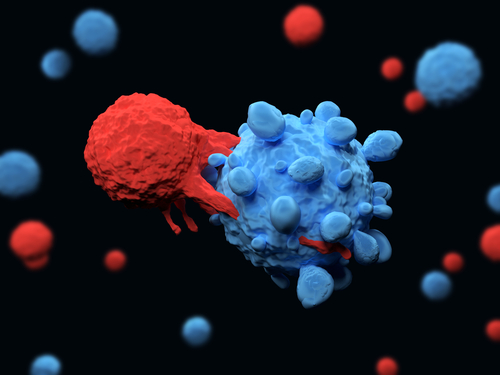TTI-621, an investigational molecule developed by Trillium that turns macrophages against tumor cells, was granted orphan drug status by the U.S. Food and Drug Administration for the treatment of cutaneous T-cell lymphoma.
The designation aims to encourage therapies for rare and serious diseases by providing benefits such as seven years of market exclusivity if approved, exemption from some FDA application fees, and regulatory guidance during the clinical stage.
TTI-621 activates the immune system against cancer cells by blocking the activity of a protein called CD47. Commonly detected at the surface of cancer cells, CD47 works as a “do not eat” signal for the immune system, allowing cancer cells to thrive.
The therapy is a SIRPaFc fusion protein made from a CD47-binding domain linked to a region of a human immunoglobulin (IgG1). It works as a decoy preventing CD47 from delivering its “do not eat” signal, leading to the activation of the macrophages – the immune system’s “big eaters” – that are then able to recognize, engulf, and destroy the cancer cells.
TTI-621 is currently being evaluated in two clinical trials.
In a Phase 1 study (NCT02663518), currently recruiting participants, the therapy is being tested in certain solid and blood cancers, including T-cell lymphoma. The trial is two-fold. First, lymphoma patients will receive escalating doses of TTI-621 to characterize the treatment’s safety, tolerability, maximum-tolerated dose, and how it behaves in a patient’s body.
After establishing the best treatment dose, patients with a variety of blood cancers and selected solid tumors will receive TTI-621 alone or in combination with other anti-cancer drugs – Rituxan (rituximab) and Opdivo (nivolumab). This part of the trial will continue to measure TTI-621’s safety and will help characterize its efficacy.
A second Phase 1 trial (NCT02890368), also recruiting participants, will test the therapy’s effectiveness when injected directly into a solid tumor.
“The FDA’s decision to designate TTI-621 as an orphan drug underscores the urgent need to develop additional therapeutics for patients with cutaneous T-cell lymphoma,” Dr. Niclas Stiernholm, president and CEO of Trillium Therapeutics, said in a press release.
“We believe that our investigational drug holds promise as a potential new treatment and will continue advancing the compound through clinical development in both of our trials,” he added.
“People living with cutaneous lymphoma desperately need new and better treatment options,” said Susan Thornton, CEO of the Cutaneous Lymphoma Foundation. “As an advocate for the global patient community, we are delighted to see Trillium working diligently to advance its drug candidate TTI-621.”


